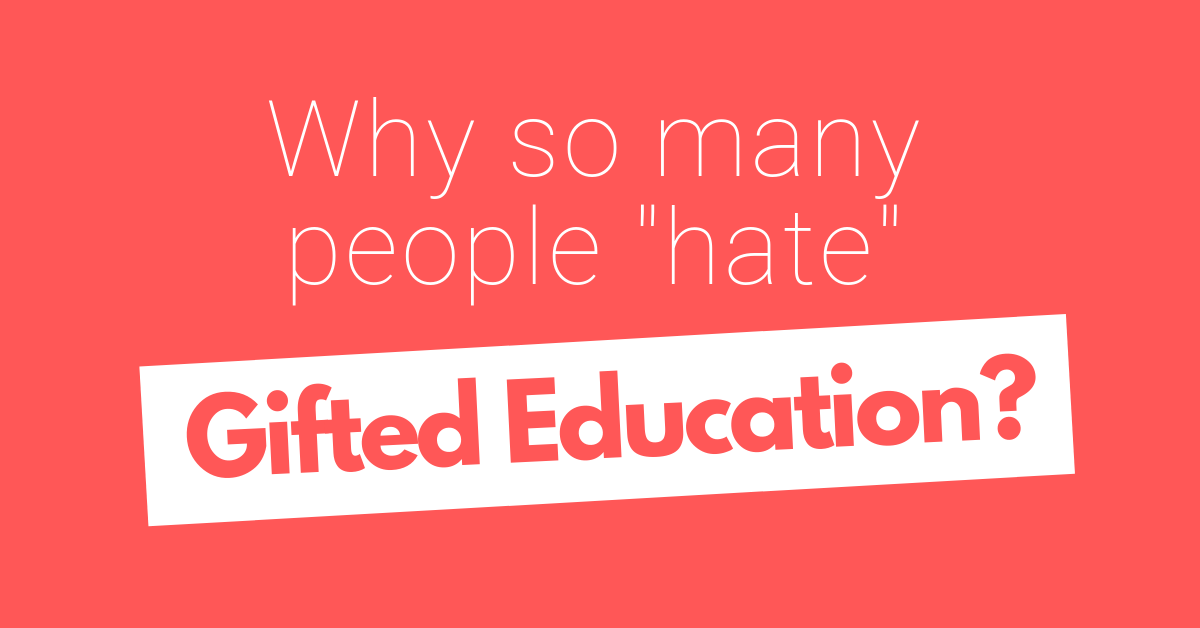
Shall We Ban Gifted Education?
It has been our observation over the years that high ability or gifted children in the academic field are seen as being very blessed or lucky by the society at large. After all, these whizz kids only need to spend very little time to achieve excellent academic results compared to their peers of average intelligence. These are the group of students who will eventually go to your top institutions and universities and end up the nation’s policy makers, organizations’ leaders and the movers and shakers.
The world sees that this group of people are already very privileged, having IQs significantly higher than most people and are naturally fast learners and high achievers. Why then, should society invest more resources into these “already blessed lot” rather than the less privileged group with real learning difficulties like Down’s syndrome, autism or the physically challenged? It is very logical for most to think that way.
The reality is that the members of this crème de la crème “privileged lot” are also special learners. We assume that they are all fast learners and high achievers from birth, if born with high IQs. There are numerous scientific research and studies to show that if this group of high ability children are not identified, intervened and nurtured, many of them may perform less than your average kids and may lead sub-optimised lives. The high IQ gift from the creator is a double-edged sword; it can either be an edge or a curse in life, and my colleagues and I have seen far too many cases in our years of interactions with these precocious children. It always saddens us when we see a demotivated bright spark on that downward spiral.
From Joseph Schooling, the Olympiad gold medallist to Lang Lang the piano prodigy, the world has recognized these special talents in music, sports, art and are prepared to provide resources like professional training and coaching at a young age to nurture these talents. In Singapore, we have SOTA, Singapore sports school, special music and art elective programmes to develop the performing arts and sports talents. Schools/Programmes to work on the gifted and talented children in art, music and sports are well received by society.
Why then, are there so many controversies raised when it comes to the intellectually gifted/talented? Is it really an elitist approach perceived by part of our society? Or should this “privileged lot” be categorised under children with special needs in education, who require our early intervention and nurturing from young, and to bring out their potential for the good of themselves and our society where human capital is our only ingredient in success. To further push this envelope, some developed countries like Australia, New Zealand and the United States already have laws protecting the rights for a special education programme to this group of children with special education needs.
Despite the multitudes of research papers and experiences supporting the needs for Gifted Education, there are still far too many criticisms by society at large against putting in more resources for this already gifted lot. Not providing special education to these high ability children is actually tantamount to deliberately asking the potential Olympians like Joseph Schooling to slow down or even stop for the rest to catch up, so that we can all relegate them to the lowest denominator for a more inclusive society.
As a group of educators who have been working with gifted children, some with special needs, it gives us great motivation to help tell their side of the story…their frustrations, challenges, loss and discrimination which they may suffer from anti-intellectualists. And for those who have the real privilege of continued blessings; their joy, actualisation and achievements when they are identified, motivated and given the growth mindset to be both high ability learners and achievers.
As a nation without natural resources, a society who has scarcity of human capital, let’s protect, and nurture this group of talented children. They could be talented in one domain or even multiple domains and give them the equal opportunities to learn at the pace, and content which will stimulate and nurture their talent.
Equal opportunities in education doesn’t mean equal results for everybody. Different children need to have different diets to bloom. The beauty of diversity enriches our human capital pool, and our future movers and shakers will emerge from this pool of gifted learners.
Learn more about our programmes here.
